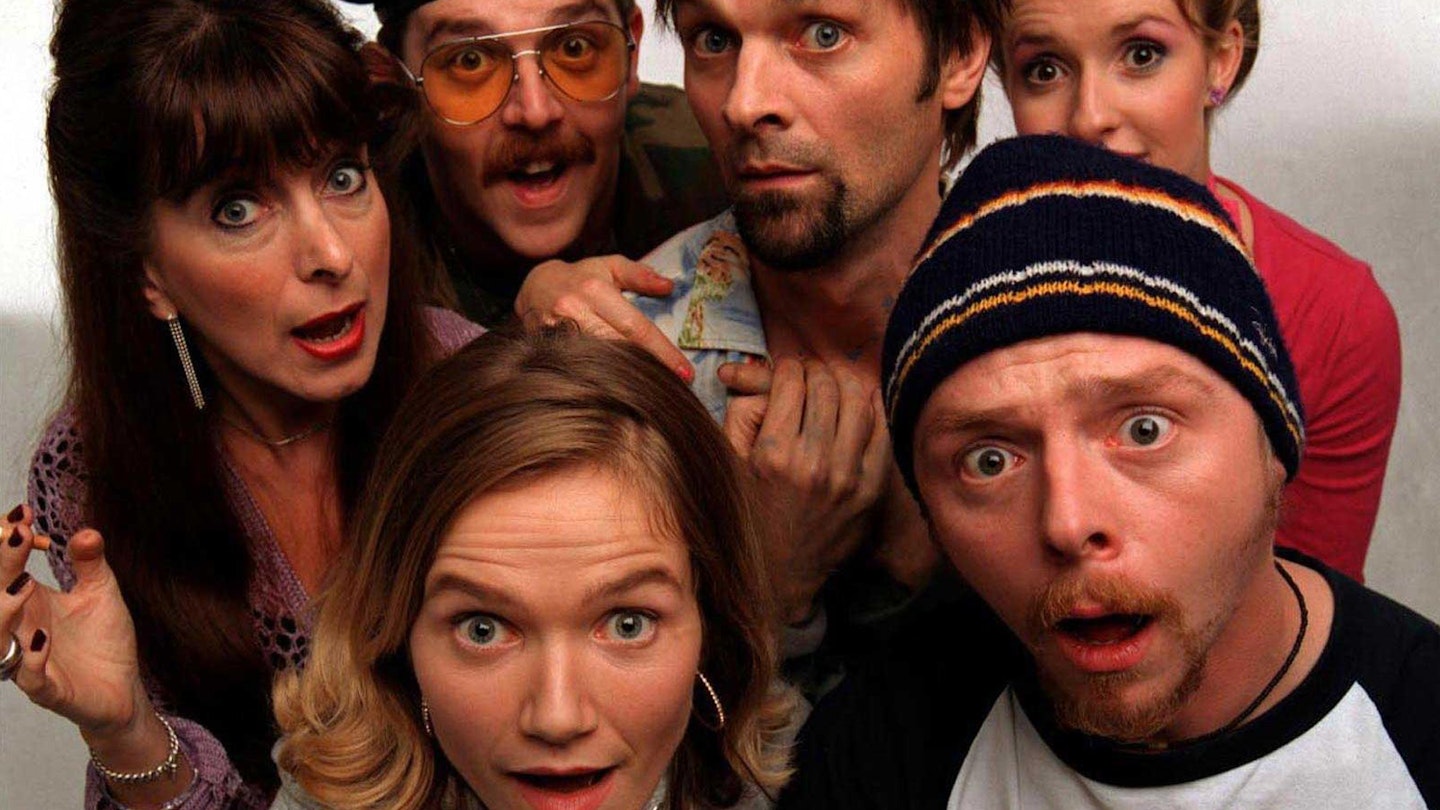Before Shaun Of The Dead, before Hot Fuzz, before The World’s End, the project that first brought together the likes of Edgar Wright, Simon Pegg, Jessica Hynes and Nick Frost was Spaced. The ‘90s sitcom was unlike anything else on the box – a show that imbued the relatable predicaments of London-dwelling twenty-somethings (the perils of renting, romantic failures, attempts at creative endeavours, bursts of rave culture) with deep-cut pop culture references and genre nods. In 2008, Empire spoke to the key players in this one-of-a-kind comedy to tell the story of how it came to life – and now on its 20th anniversary, here it is for your reading pleasure. Bring your own Jaffa Cakes.
We're Just Mates Aren't We? We're Chums!
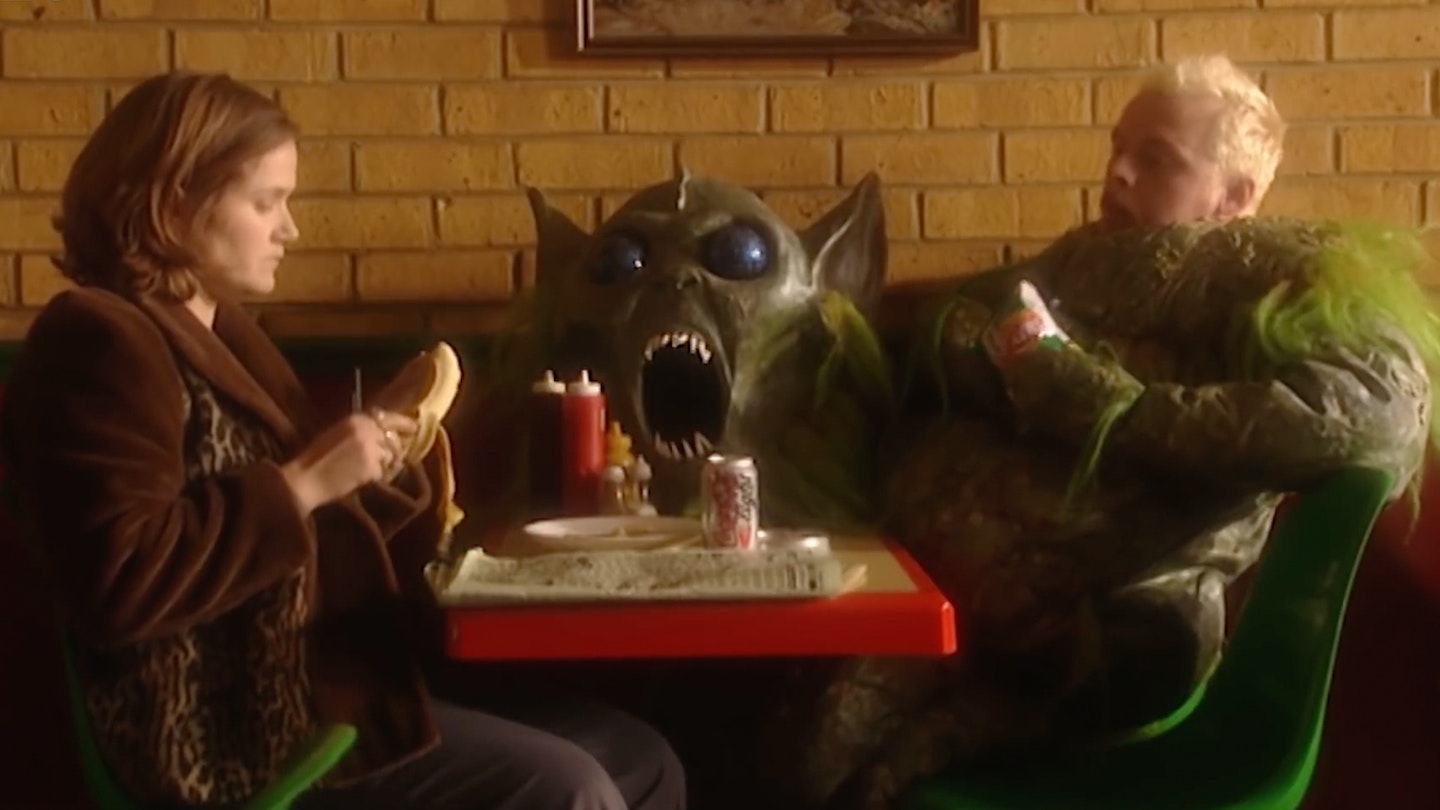
Edgar Wright: At the time of the first series, we were living Spaced. We were those people. I was 24, Jess was 26, Simon was 27. Simon was living with Nick and playing PlayStation all the time. Jess was in a similar mindset to Daisy and she'd been through all the squats and so on. I was living in a flat as big as this room and watching loads of films. So it was essentially just reflecting us in a mirror.
Simon Pegg [Tim Bisley]: One of things that Spaced was, was a reaction to the emergence of these 'youth sitcoms' that were trying to be the British version of Friends, and usually were written by people 20 years older than the characters. I'd say specifically Game On and Babes In The Wood…
Jessica Hynes [Daisy Steiner]: I wouldn't say Game On was directly responsible for Spaced, but I remember watching it and thinking that there was nothing I could relate to at all. It felt like an older executive had crafted a show for a younger audience.
Pegg: People that were making programmes for our age weren't our age. So we thought, "Let's do that," and make a show that speaks very specifically to people like us. Jess went away and wrote this treatment that was the foundation for the whole show.
Hynes: I didn't want to write about the kitchen sink of Britain. I was groping towards some kind of imaginative realism. One of my first ideas was Daisy going back and travelling into her subconscious and memory, but also physically going into some kind of cavern where there were various things from her past. Simon was interested in creating a narrative that people could relate to, particularly about unrequited love in a modern setting. The referencing thing, that aspect of Spaced, was absolutely Simon.
Pegg: There's tons of stuff we came up with that's still on my computer. I remember we were going to add one episode where Mike gets struck by lightning and his moustache comes off. And then all his military leanings go away and he just becomes a civilian, because his moustache has burnt off.
Hynes: Mike was really fun to work with. I really wanted to see his character in a sort of disco-dancing dance-off.
Pegg: His sexuality was always interesting. He's very asexual, and when we played with the idea of him dealing with girlfriends early on, we might have ended up getting him together with [Reece Shearsmith's character] Dexter or someone like that. Or him just admitting he was gay.
I’m Andy McNab, I'm Andy McNab, I'm Andy McNab, I'm Andie MacDowell
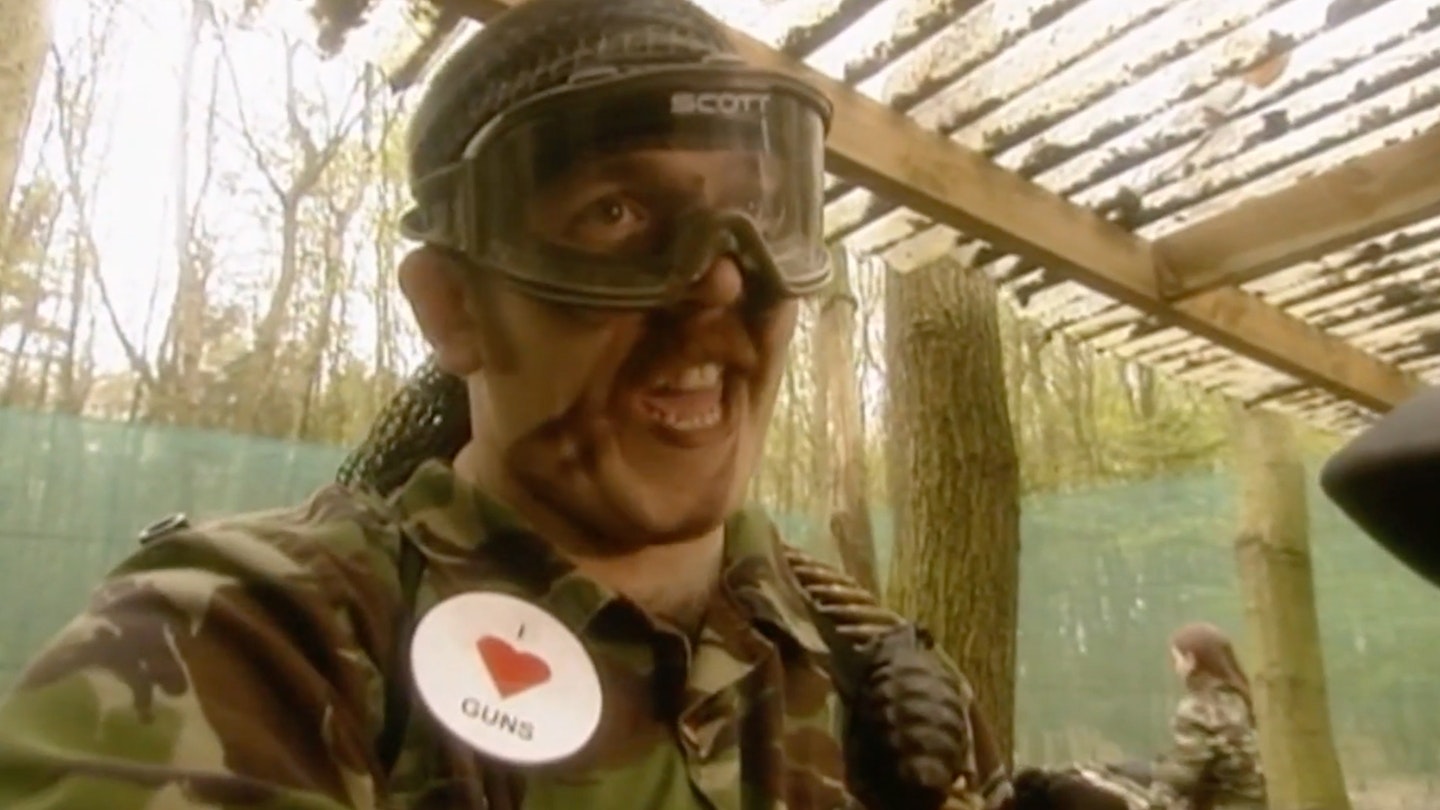
Nick Frost [Mike Watt]: I had never acted before, and there was no audition. Simon and Jess wrote Spaced, and Simon insisted that they had this character Mike Watt and that I would have to do it. Back then, Mike was older, an expert assassin who could remove a man's blood and replace it with Tizer without him knowing. I had met Edgar and had been around at parties and stuff, but I was fairly quiet at that point and wasn't seen as a performer or a stand-up in my own right - I was just known as Simon's friend.
Wright: The first time I met Nick was in a pub in Battersea. He just said nothing the entire night, he was just really, really shy. I was just worried, thinking, "This guy who's barely said a word to me is playing one of the big parts in the show." His first couple of readings weren't bad, they were just quiet. It was obvious that he was very comfortable with Simon. But he really came into his own when we started filming the first series.
Frost: I don't think Edgar really wanted me to do it. I think he had said to Simon, "Do you think he can do it? Do you trust him?" And I kind of hated Edgar for that. I think it was a big, big gamble for them to take, really.
Wright: There's another actor called Nick Frost who's been in The Bill. So I think Simon lied about Nick's experience, saying he'd done stand-up when I'm pretty sure he hadn't, and so on. So there was some subterfuge there, but it was all for the greater good.
Oh Mummy, Oh Daddy, Let's All Play Kabadi
Wright: We shot the first series in Twickenham, on the same stage as An American Werewolf In London, in fact.
Hynes: There was no let-up from the beginning until the end of the filming day. But Edgar was so brilliant with the framing and the shots - he covered scenes in a way that was unbelievable.
Pegg: Oh, the whole thing was a horror from start to finish. We didn't have trailers, we just sat on a double-decker bus and we didn't complain! I look back and think, "Oh my God, it used to be shit!" But we just had the feeling that we were really doing it, really making our own show.
Wright: I remember one day when it just got so, so complicated. To save money, we were doing the scenes for seven different episodes in one day, sometimes jumping back and forth. It just leads to a total meltdown.
Michael Smiley [Tyres]: Being directed by Edgar was like being talked to by someone from the Children's Film Foundation. He was like a little genius from the Double Deckers. He'll leave no shot unshot. He'll get everything he can out of a scene.
Peter Serafinowicz [Duane Benzie]: I didn't expect the paintball episode to look as amazing as it did, because there was no precedent. I didn't think it would look like a movie, and it did. They had so little money, it was surprising how slick it was.
Frost: I thought it would be great to do a big, hammy death scene, complete with yellow blood and Simon holding me. That scene is very powerful, but when we shot it, it was very dark and we had no time, and Edgar was getting really stressed out. So it's funny to look back at it now because it looks really poignant.
Pegg: The clubbing episode was great, too.
Smiley: Being an old raver, I just got it in my head that I was at a rave. When I was out clubbing, I used to jolly everyone up. It was half eight in the morning and the extras were just standing around. So I just bullied them: "Come on, get up and fucking do this! It's a club!" I was buzzing.
Hynes: It was great though, because it was an ensemble and adrenaline-fuelled.
Pegg: Completely, although we were pretending. Mind you, I've been clubbing at that time in the morning.
Hynes: (sarcastically) Sure.
Pegg: Several times!
Frost: Every move I do during Mike's A-Team dance, I choreographed. I was a raver for ten years, so I came up with it on the spot. One of my ex-girlfriends is in that scene too, as an extra, and I can't really watch that scene without looking at her and thinking, "You broke my heart, you bitch!"
Cock, Locked And Ready To Rock
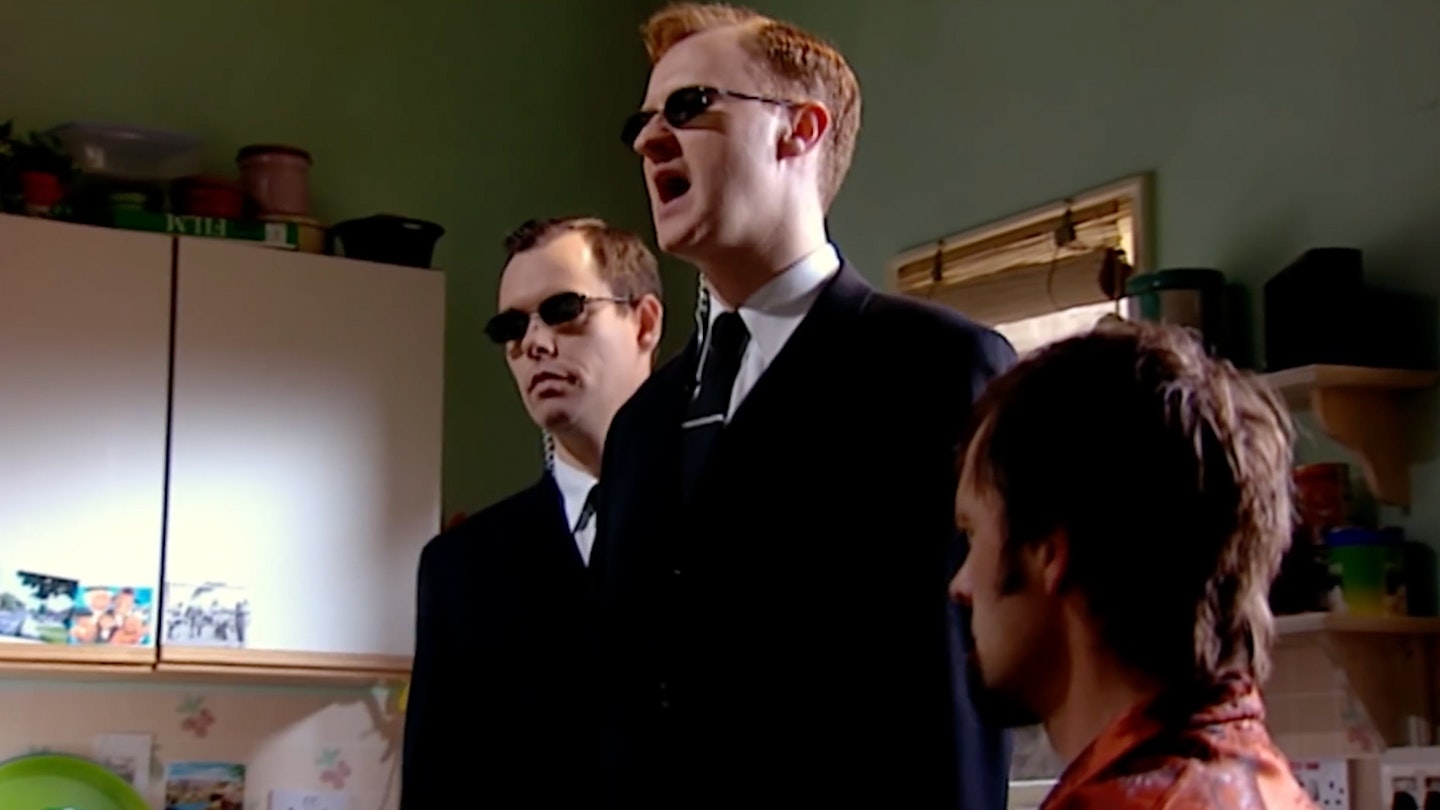
Wright: The first series was more fun than the second. By the second one, I'd just split up with my long-term girlfriend and we were still working on the show together, so it became like my divorce album. But through no fault of anybody's but my own, I really beat myself up if something didn't go right; if we didn't get all the shots. I just sat there being in a bit of a black mood. And these moods increased over the second series as it became harder to make.
Hynes: The second series is a little more adventure-led; with no less character development or detail. But it's all about the caper. And that was good because we were really excited about writing capers.
Wright: Doing the commentaries, we all agreed that The Matrix episode in series two was a bit too much. Maybe that's because the Matrix sequels were terrible!
Pegg: It's like getting a tattoo of the Bat-Signal, and then having Batman & Robin come out.
Wright: I still like that episode. And the Robot Wars episode gets very silly, but I still like that. Sometimes the insane ambition of it is amusing regardless.
Katy Carmichael [Twist Morgan]: I remember the food fight in series two. We just spent an afternoon throwing cake at each other and we're like, "This is great! We're a bunch of friends plastering cake in each other's faces and getting paid for it!"
Wright: A bit I could watch again and again is the John Woo shoot-out in the alley in Camden. It's probably my proudest moment in some ways.
Pegg: It was something I was always trying to fit into my stand-up, this idea that men have this unspoken code when it comes down to slow-motion gunfights. Jess and I had written an episode that wasn't very good. It was a separate-girls'-and-boys'-night-out kind of deal. It just wasn't going anywhere. Edgar said it wasn't good enough. We admitted we felt the same, so we went to a cafe and thrashed out episode five in half an hour. It was one of the best episodes we ever wrote, and we finally found a home for the slow-motion gunfight. It became the climax.
Babylon 5's A Big Pile Of Shit
Hynes: The referencing was the most natural thing. You would automatically enter stuff that came to mind. Sometimes you'd just start off with a concept like the Robot Wars episode or whatever, and then the Fight Club thing just came out of that because it's one of my favourite films.
Pegg: But we never had a list of things to include.
Wright: One of the things that got me thinking is how personal many of the references were. Like when we say that Daisy goes to see Akira at the ICA - Jess based that on the first date she went on with her boyfriend. All of these things have a connection. It wasn't like the makers of Date Movie and Epic Movie who just thought, "Oh, what films have come out in the last six months? Let's do that!" Those things all meant something to us.
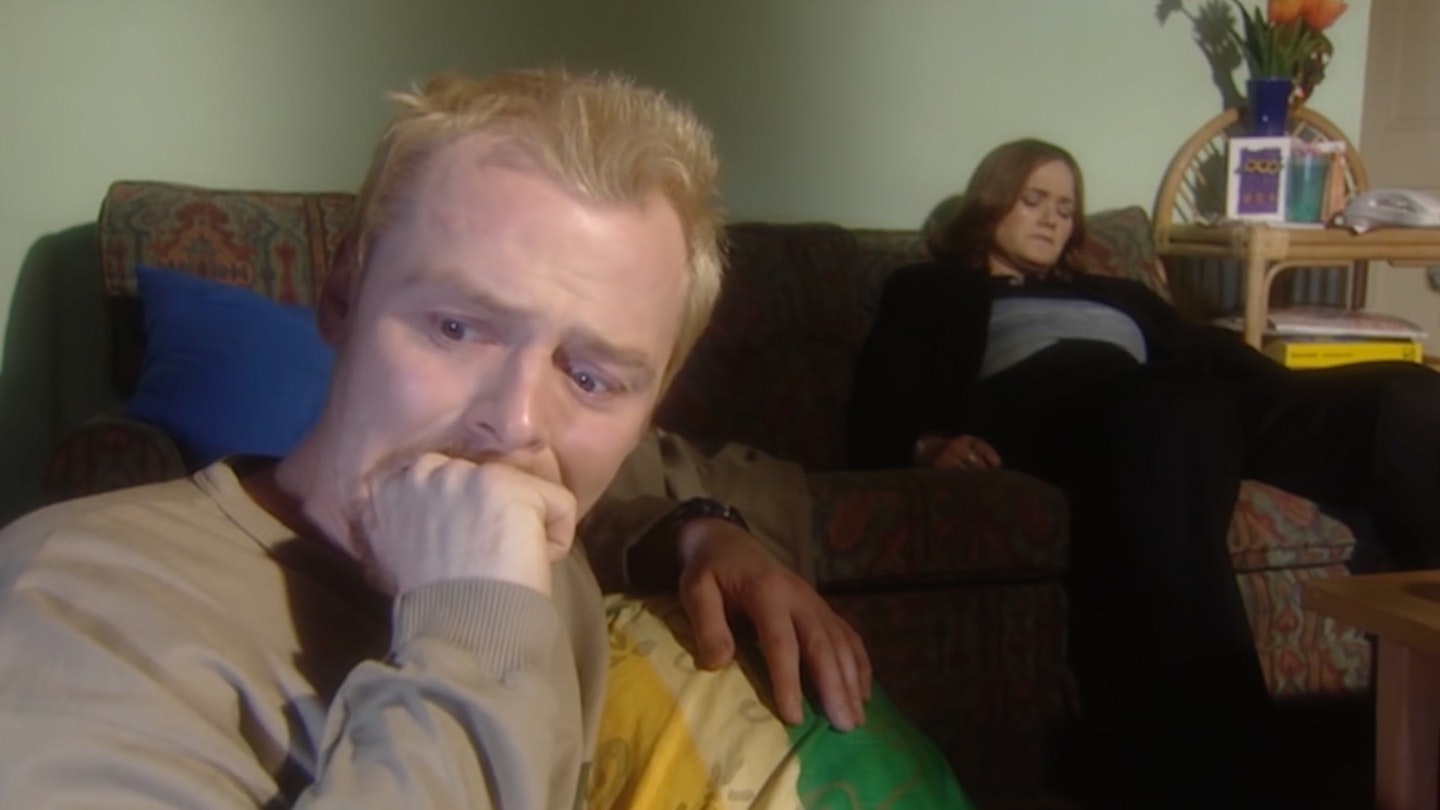
Julia Deakin [Marsha Klein]: Ninety per cent of the references passed me by. I didn't know what the fuck they were talking about. I'd say, "Simon, why do you want me to lean against this door and say, 'I love it when a plan comes together,' with a fag in my mouth?" And he said, "Don't worry, just say it."
Pegg: Tim and Daisy almost live their lives through popular culture - the show is like their account of what happened. You can imagine saying, "I was working in this place and it was like fucking One Flew Over The Cuckoo's Nest!” So Spaced is Tim and Daisy telling you what their lives are like, but the only references they use are from popular culture.
Jar Jar Binks makes the Ewoks look like fucking Shaft!
Pegg: We weren't allowed to use Star Wars merchandise during the first series because The Phantom Menace was about to come out and they clamped down. When they saw how Star Wars-loving the first series was, they actually came to us and said we could have anything we want. By which time we were like, "We don't fucking want it."
Serafinowicz: At one point I reprised one of my Darth Maul lines (Serafanowicz was the voice of the acrobatic Sith apprentice) - "At last, we will have revenge." That was a big bonding thing for me and Si because we were so hugely disappointed by The Phantom Menace.
Pegg: I have friends at Lucasfilm now, and one of the most beautiful things for me was when they released the original trilogy untouched without the Special Edition moments, as they were in 1977. I got a parcel in the post and it was an embossed box with Lucasfilm on it with the untouched trilogy inside with a note that said, "We thought you'd like these." That was just the most wonderful thing. And I know a lot of people in the organisation agreed with me! I can't say who.
You Lucky People
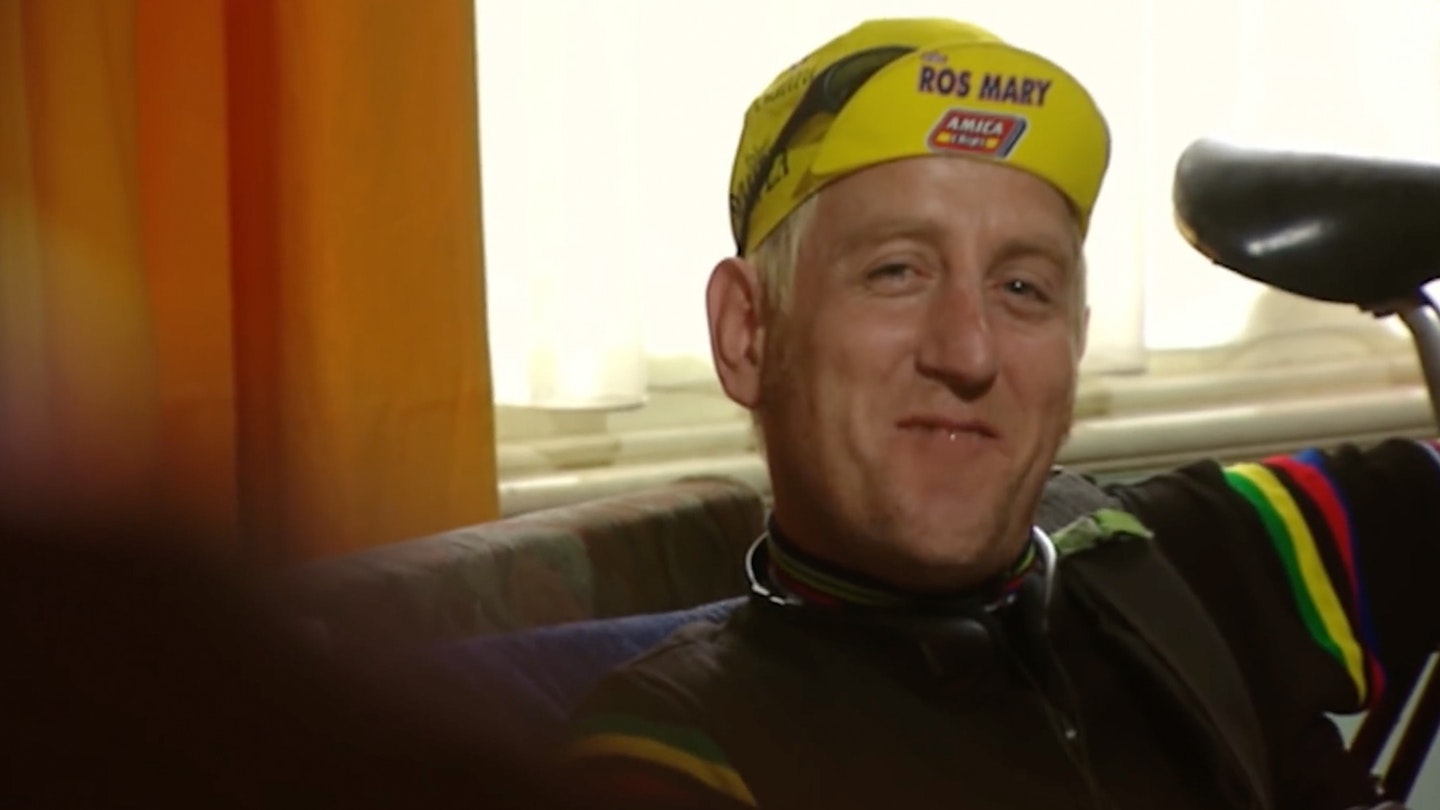
Wright: The first series went out between Friends and Frasier at 9.30pm on a Friday, which is a strange slot in a way. We always ended up losing something like two-thirds of Friends’ viewers. The second series didn't rate as well as the first. It was just that Friday night slot. You'd think it would be a golden slot, but for our show it wasn't.
Pegg: We should have aired it on a Sunday night, because everyone the show appealed to was probably out on Friday. But it was always critically well-received.
Wright: I'd say that a huge portion of the Spaced fanbase came from the DVDs rather than the TV. Nick Lee started doing the spaced-out.com website by episode three of the first series, so we were probably one of the first shows to profit from an internet fanbase. I think with the DVDs as well, we really took pride in our DVDs. That's probably why it resonated for such a long time, because it never got too big when it was out.
Pegg: The people who love it, really love it. I think it's because it speaks very personally to a lot of people. I think as a viewer you respond to being treated like an intelligent adult and that makes you feel special.
Frost: I'd like to say the fans are weirdos who send me breasts in the post, but they don't. Every year we get lovely Christmas and birthday cards, and presents - I'm actually wearing a Ralph Lauren polo shirt now that (Frost's fansite) the Frostitutes bought me for my birthday this year.
Carmichael: People stop me in the street and say, "Twist!" and they're always students or quite funky, interesting-looking people. With Coronation Street (post-Spaced Carmichael played Lucy Barlow) I only got old ladies.
Frost: There was a Spaced conference about five years ago, in a pub in Finsbury Park, and there were actually two or three Mikes. Which was very nice. It was weird, because you always have to say to them, "Listen, don't bring that gun out. I know it's a plastic gun, but don't bring it out."
Wright: We had Quentin Tarantino with us on the commentary and we had a scene referencing Pulp Fiction. And to have him in the room... it's incredible. If I could go back eight years and say, "Hey, Quentin Tarantino will see this one day and he's going to do the commentary!"... You would never imagine these things would happen.
Pegg: Every little joke he'll repeat and laugh about. It was heartening how much he got.
Hynes: I'd brought one of the Scrabble tiles because I thought it would be a nice talking point. It was my one piece of treasured memorabilia. I brought it with me and Tarantino said (mock Tarantino voice), "Can I have that?" and I was like, "Ummm..." I can't remember the last time I felt so conflicted, so much so that I welled up with tears because it was so painful. I gave it to him and he's going to put it in the cabinet on his wall. But him being there was one of the best moments on my Spaced journey.
It's Not Finished... It's Finished
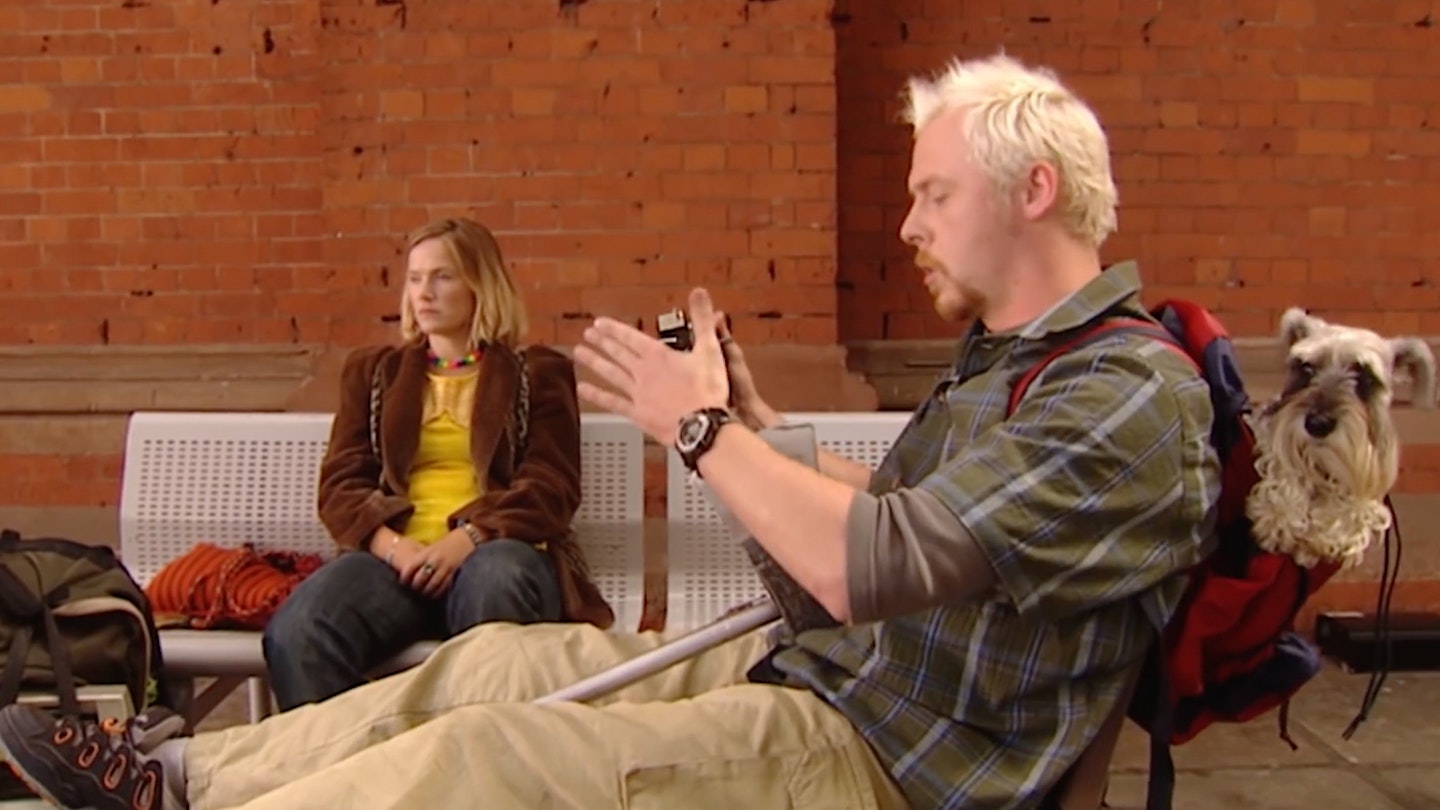
Wright: A third series? I say I'd never do another one, but then I see something like Before Sunset and think, "Hmmm... what if?" I won't string people along saying there might be another one. It's not like we haven't thought about it; but there would only be other complications. It frequently threatens to take shape.
Hynes: It takes at least six months to write. It's a massive, massive undertaking. Finding the time is hard.
Pegg: We came up with an opening scene for series three - it was a play on the first episode. It was Tim and Daisy in a restaurant. It looked like they were talking to each other but the camera would pan to reveal they're talking to different people - they weren't really friends anymore, they were with partners. So you thought they were in love, but they'd actually separated.
Hynes: I feel bad, being a tease in that way saying, "We might do it, we might do it"; I think it's wrong to do that. It would be great to do, but the logistics are prohibitive.
Skip To The End
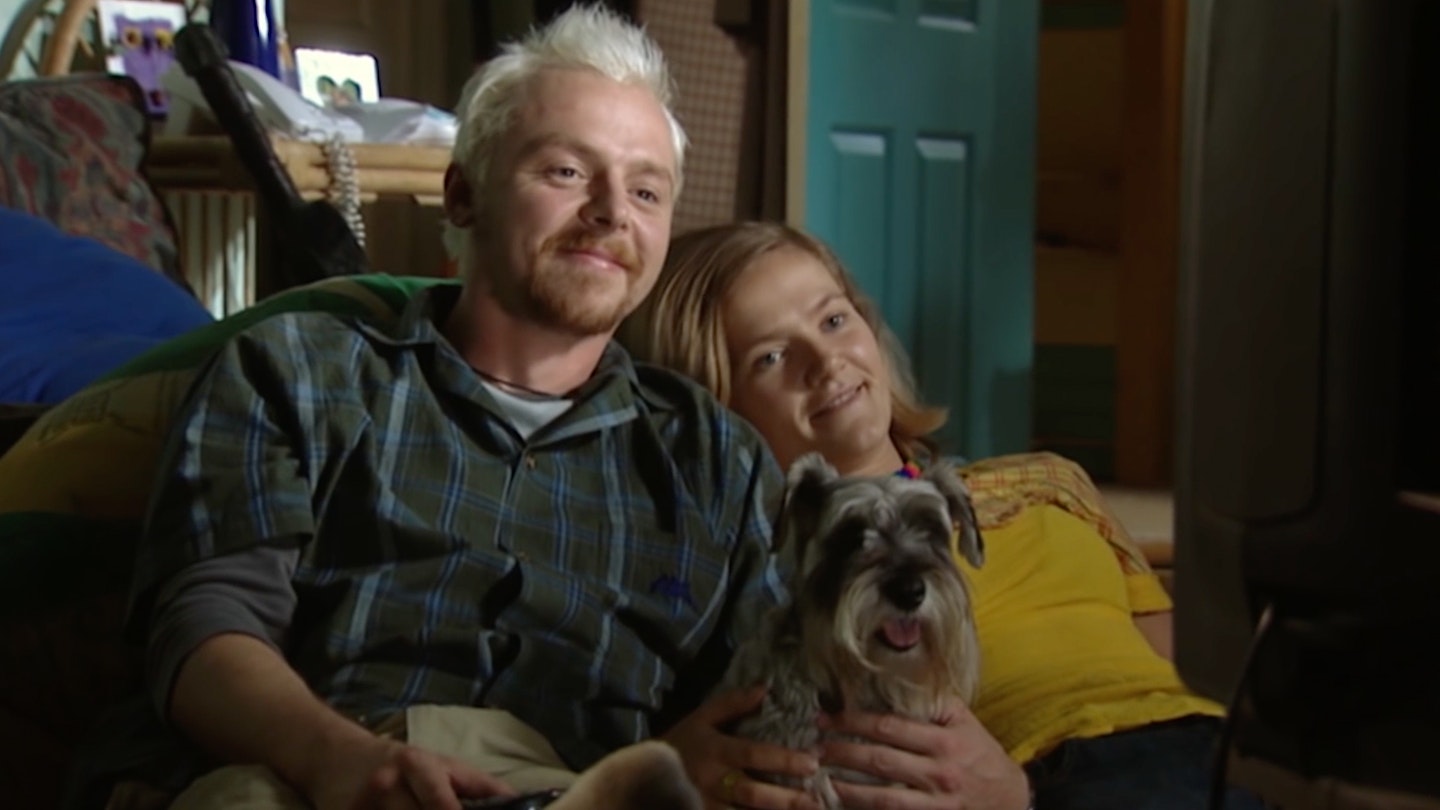
Pegg: We just made the kind of show that we'd want to watch flicking through the TV on a Friday night, that's all. And we found out that other people wanted the same.
Wright: I'm still very, very proud of it. The one good thing that came out of the (attempted) American remake is how painful it was. It just brought it home how precious it was to me, Simon and Jessica. The fact that it would make me physically sick to think that someone else was abusing our child. It just made that fact even clearer than it already was.
Hynes: It's an incredible privilege to be interviewed by Empire. That would have made my fucking life years ago, but you get used to it (laughs).
Pegg: And another thing that's interesting is that, because it's Empire, it just goes to show how filmically relevant the show was.
Hynes: That's why I say it's a fucking privilege! It's not even a film! This is a level of credibility I'd never have dreamt of. I know I'm sounding sarcastic and disingenuous, but that's just what I'm like.
Pegg: What, sarcastic and disingenuous?
Hynes: Oooooooooh..
